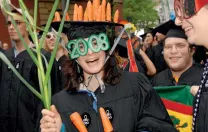Three women and seven men received honorary degrees at Commencement. Provost Steven E. Hyman introduced the honorands, and President Drew Faust read the citations, in the order below. At a dinner the evening before, Faust noted that an honorary degree had also been voted to former Faculty of Arts and Sciences dean Jeremy R. Knowles, who died on April 3 (see page 69); she was able to tell him last winter that he had been so recognized. Faust called for a moment of silence and thanksgiving in his memory at the beginning of the morning exercises. She also announced on both occasions that the University had voted to award a degree to Edward M. Kennedy ’54, who had intended to attend the dinner and the morning exercises but could not after undergoing surgery on June 2 for a malignant brain tumor; the degree is to be awarded at a later date. Faust cited Kennedy’s 45 years of “able, energetic, and influential” service in the U.S. Senate, particularly his advocacy for education and higher education.
Eric R. Kandel ’52. A University Professor at Columbia, he is a pioneering neurobiologist who shared the 2000 Nobel Prize for Physiology or Medicine. Doctor of Science: In the synapses of sea slugs and the hippocampi of mice and men, he fathoms the mechanisms of memory and illumines the biology of mind.
Gerda Lerner. The University of Wisconsin’s Robinson-Edwards professor of history emerita, she is considered the founder of women’s history, and established the first graduate program in the field, at Sarah Lawrence. Doctor of Letters: Fusing life and thought, resilience and brilliance, she has unveiled the deeds of ordinary yet extraordinary women, forever altering the future of the past.

Photograph by Stu Rosner
James P. Comer. The Falk professor of child psychiatry at the Yale School of Medicine, he created the School Development Program, which applies principles of child development to advance students’ learning and healthy growth in formerly troubled schools. Doctor of Laws: Eminent expert on child development, he enlists family and community to enhance the culture of education, reshaping schools as new havens of learning.

Photograph by Stu Rosner
Wen C. Fong. Sanford professor of art history emeritus at Princeton, he helped establish the nation’s first doctoral program in Chinese art and architecture; its graduates hold leading teaching and curatorial positions worldwide. Doctor of Arts: Opening the eyes of the West to the art of the East, in the painter’s hand he sees the heart’s desire, and in the beauty of brushstrokes the breath of life.
John McCarthy. Professor of computer science at Stanford, he has studied artificial intelligence since 1948, and coined the term itself in 1955. He was awarded the National Medal of Science in 1990. Doctor of Science: A cardinal scholar of computer science, whose forays logical and algorithmic serve as source code in the quest to make machines think.

Photograph by Stu Rosner
Janet D. Rowley. The Blum-Riese Distinguished Service Professor at the University of Chicago, in 1972 she discovered the causal relationship between genetic translocations and cancer. She received the National Medal of Science in 1999. Doctor of Science: Sage cytogeneticist of the Second City, whose transformative work on chromosomal translocation marks a triumph in translational medicine.

Photograph by Stu Rosner
The Honorable Damon J. Keith. U.S. Court of Appeals Judge for the Sixth Circuit since 1977, now on senior status, he has written important decisions on employment discrimination, school desegregation, and civil rights, including the ruling in United States v. Sinclair, which prohibited warantless wiretapping. Doctor of Laws: Avatar of independence, champion of equal justice under law, a just and humane jurist who has shared and shaped the action and passion of his time.
Daniel C. Tosteson ’46, M.D. ’48. The Walker Distinguished Professor of cell biology served as dean of Harvard Medical School from 1977 to 1997, transforming the curriculum and advancing fundamental research. Doctor of Science: Dean of his era’s deans of medicine, a pathfinding educator and generative force in research fervently focused on easing the burden of human disease.

Photograph by Stu Rosner
His Highness the Aga Khan ’58, G ’61. In his junior year, he became the forty-ninth hereditary imam of the Ismaili Muslims. The Aga Khan Development Network has improved living conditions and fostered pluralism and democracy in developing nations, building bridges between the Islamic world and the West. Doctor of Laws: Imam of the Ismaili Muslims, visionary exponent of education and development, whose abundant good works and eloquent words create hope for understanding across ancient divides.
Joanne Kathleen Rowling. She is known to and beloved by hundreds of millions of children of all ages, thanks to her seven Harry Potter books, now translated into 65 languages. Doctor of Letters: A wizard with words whose spellbinding tales enchant millions of Muggles with a love for the magic of reading.






